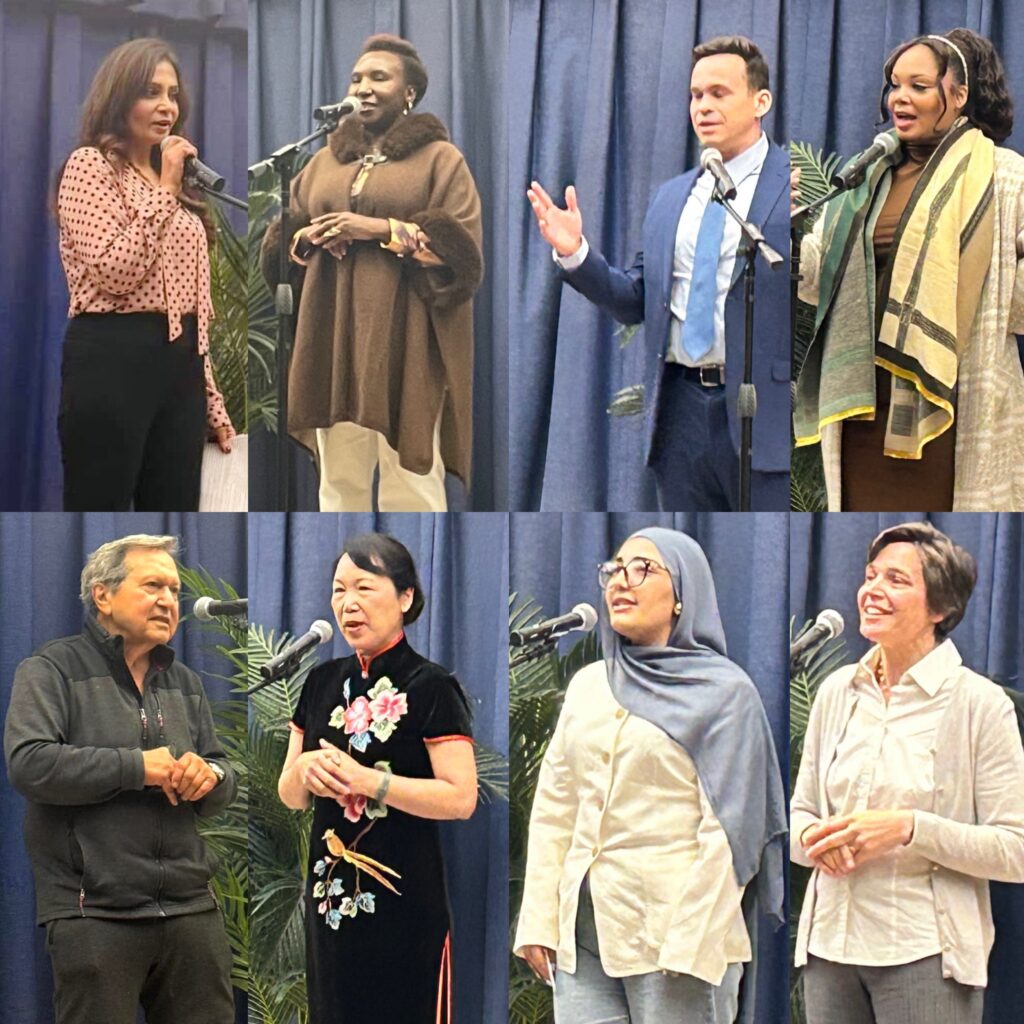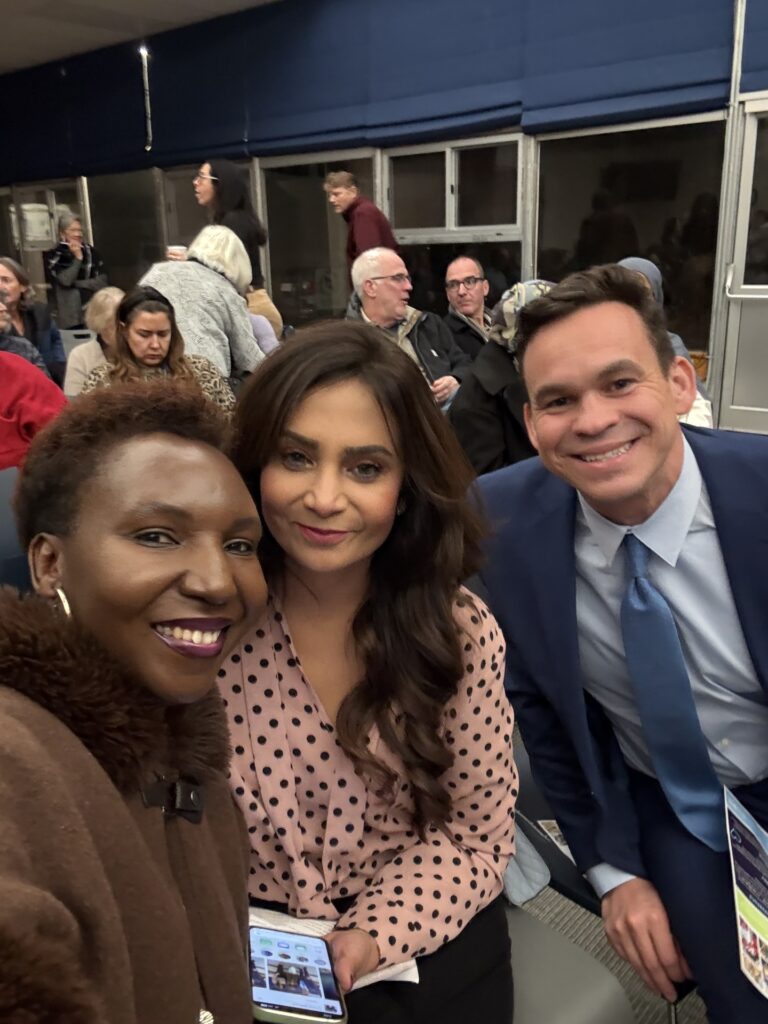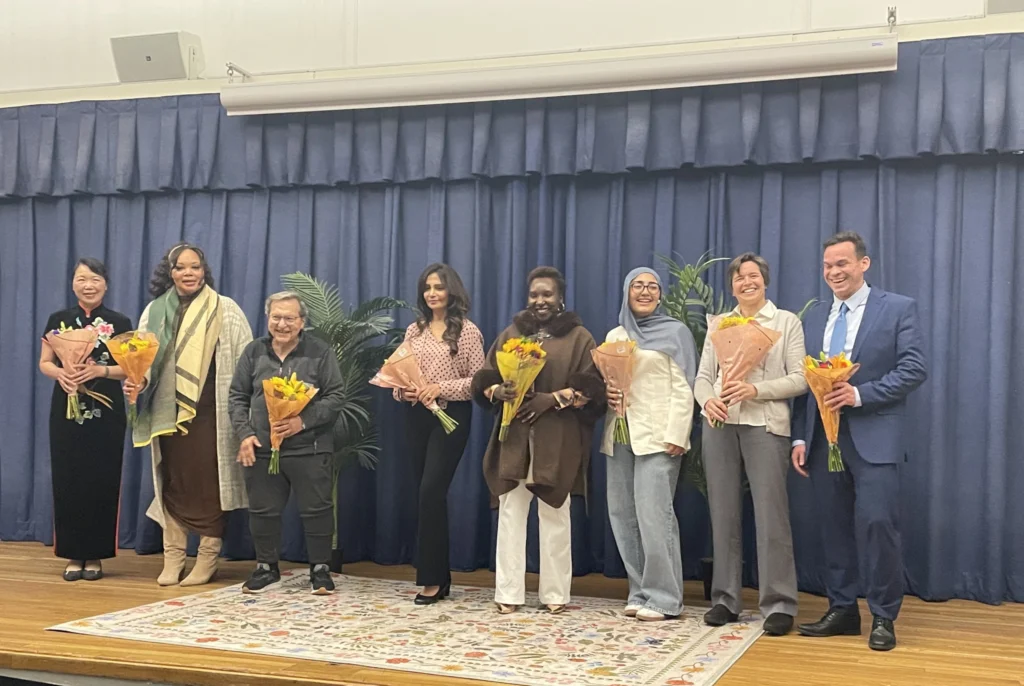The Moth-style story night last week at Acton Boxborough Community Compass (ABCC) was one of many storytelling events over the past many years organized as fundraisers for the ABCC (formerly Acton-Boxborough United Way), produced by Acton resident David Gerratt’s Fugitive Productions.

On Wednesday, November 12, a full house of about 100 people at the Resource Center in the old Merriam School building enjoyed eight, five- to eight-minute personal stories on the theme, “Coming Home to Acton and Boxborough.” All but one of the tellers were foreign born and now all live in Acton or Boxborough. Tellers were asked to share a true story about how they came to call Acton and Boxborough “home,” with no notes or props, in the style of the Moth. The Moth is a storytelling series founded in 1997 by a novelist trying to recreate a tradition from his native Georgia of telling stories on a porch at night, with the moths flitting toward the light.
Most of the tellers had never told this kind of story in public before. After being identified by ABCC representatives or Fugitive Productions, David Gerratt met beforehand with each teller to offer some tips on how to approach this kind of story sharing. Their stories were personal and compelling.
Vivian Kobusingye Birchall spoke about her path from southwestern Uganda to Hawaii to Acton, where she is raising her family while working at Acton TV, earning a Masters degree, and active in community life, including a run for public office. (You can see an interview of her in a youth-created show at Acton TV.) Birchall said that it wasn’t until she found community here in Acton that she felt she was finally “home.”
Sal Lopes told about his immigration from Sicily; his studies, as an Italian-American, at Lincoln University, a historically Black college; his service in the Peace Corps in Liberia; and his life in Acton.
Carol Buysse experienced the generosity of Acton neighbors who took care of her kids and provided meals when her husband was healing from a bicycle accident.
High School senior Tooba Amin came to this country from Karachi, Pakistan, and ultimately found a community in Acton that felt like home when, as a freshman, she joined the diverse group of “sweet and kind” students in the Muslim Student Association. Through that group and as an intern at Community Compass, Amin learned a lesson: “I don’t mean to use a cliché, but home is not a place but it’s the people.”
Sahana Purohit was so homesick when she and her husband first immigrated from India that she racked up a $1,200 phone bill calling home. That was years ago. She has since found a feeling of belonging in Acton, in part through involvement in Town committees.

State Rep. Dan Sena arrived from Brazil at age 14 with his mother, as she fled a difficult family situation. A junior high teacher, Ms. Krasnick, noticed that Sena had a pretty limited wardrobe and brought in some hand-me-down clothing for him from her own kids. All these years later, Ms. Krasnick was in the audience at the storytelling event. Sena appreciated his advantage compared with people in Brazil who had only “a bag of rice and a bag of beans.” As a young man, he translated for clients at the Metrowest Free Medical Program. “I tried to give people voice.” Sena spoke of the honor he feels to now represent the community in the State House of Representatives.
Diane Randolph Jones told the story of her childhood in the Back Bay in Boston, where she lived with her mother in a basement apartment. It was her neighbors who kept her stable. She described the many challenges she and her daughter have survived — the daughter who is “made out of steel and iron and grit and sarcasm.” In Acton, Jones found Hybid horse farm. Her daughter was first led around on a horse named “Scout.” Now the two of them own a wayward horse “who has taught us about grit and resolve and worthiness.”
Storyteller Julia Xianju Du grew up by the Yangtze River in China, studied by the Thames at Oxford University, and earned her PhD by the Charles River at Brandeis University. Du wove a tale that included advice from her grandmother, the Chinese Exclusion Act, Emerson, Thoreau, and Confucius. She was amused to learn that while her playmates were digging holes to America, others were doing the reverse in America. She said that even Thoreau wrote in “Walden” of a fellow in town who had dug a hole so deep that “he heard the Chinese pots and kettles rattle.”
Du ended her story poetically, summing up the feeling of connection inspired by the stories. “The shortest distance between the Yangtze River and here is a hole in the ground — and a story carries us both ways.”

The audience was slow to leave at the end of the stories; they chatted amongst themselves and with the storytellers, snacked on brownies and grapes, and participated in tours of the ABCC Resource Center and AB Exchange free shop.
Franny Osman is Editor-in-Chief of the Acton Exchange.













